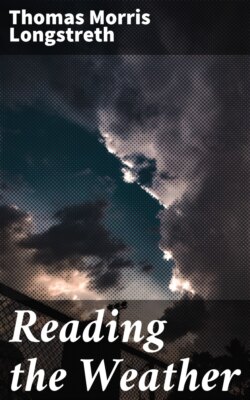Читать книгу Reading the Weather - Thomas Morris Longstreth - Страница 4
На сайте Литреса книга снята с продажи.
FORECAST
ОглавлениеTable of Contents
Science is certainly coming into her own nowadays—and into everybody else’s. Every activity of man and most of Nature’s have felt her quickening hand. Her eye is upon the rest. Drinking is going out because the drinker is inefficient. The fly is going out because he carries germs. And for everything that goes out something else comes in that makes people healthier and more comfortable, and, perhaps, wiser.
One strange thing about this flood-tide of science is that it overwhelms the old, buttressed superstitions the easiest of all, once it really sets about it. For instance, nothing could have been better fortified for centuries than the fact that night air is injurious and should be shut out of house. Then, science turned its eye upon night air, found it a little cooler, a trifle moister, and somewhat cleaner than day air with the result that we all invite it indoors, now, and even go out to meet it.
Once interested in the air, science soon began to take up that commonplace but baffling phase of it called the weather. Now, of all matters under the sun the weather was the deepest intrenched in superstition and hearsay. From the era of Noah it had been made the subject of more remarks unrelieved by common sense than any other. It was at once the commonest topic for conversation and the rarest for thought. Considering the opportunities for study of the weather this conclusion, we must admit, is more surprising than complimentary to the human race. But it is so. The fact that science had to face was this: that the weather had been and remained a tremendous, dimly-recognized factor in our level of living. So talk about it all must. And science set about finding some easy fundamental truths to talk instead of the hereditary gossip about old-fashioned winters or the usual meaningless conversational coin.
Two groups of men had always known a good deal about the weather from experience: the sailor had to know it to save his life, and the farmer had to cultivate a weather eye along with his early peas. But the ordinary business man (and wife), the town-dweller, and even the suburbanite knew so few of the proven facts that the weather from day to day, from hour to hour, was a continual puzzle to them. The rain not only fell upon the just and unjust but it fell unquestioned, or misunderstood.
At last Science established some sort of a Weather Bureau in 1870, in our country, and after this had triumphed over great handicaps, the Government set it upon its present footing in 1891. An intelligent interest in the weather was in likelihood of being aroused by maps, pamphlets, frost and flood warnings that saved dollars and lives. Then suddenly, or almost suddenly, a new force was felt in every community. It was the call of outdoors. The new land of woods and lakes was explored. Men learned that living by bread alone (without air) made a very stuffy existence. Hence the man in town opened all his windows at night, the suburban majority planned to build sleeping porches, the youngsters begged to go to camp, their fathers went hunting and fishing in increasing numbers, and, most important of all, the fathers’ wives began to accompany them into the woods.
Thus, living has been turned inside out—the very state of things that old scientist Plato recommended some thirty thousand moons ago. And among the manifestations of nature the weather is holding its place, important and even fascinating. For the person who most depends on umbrellas and the subway in the city needs to watch the sky most carefully in the woods. That old academic question as to whether it be wise or foolish to come in out of the wet was never settled by the wilderness veteran. The veteran’s wife settles it very quickly. She considers the cloud. When the commuter goes camping he rightly likes his comforts. A wet skin is not one of these. Therefore he studies the feel of the wind.
And so it comes about that the person who talks about storm centers and areas of high pressure and cumulus clouds is no longer regarded as slightly unhinged. Men are eager to learn the laws of the snowstorm and the cold wave; for, with the knowledge that snow is not poison and cold not necessarily discomfort, January has been opened up for enjoyments that July could never give.
Bookwriting and camping are both explained by the same fact—a certain fondness for the thing. I wanted to see the commoner weather pinned down to facts. The following chapters resulted. They constitute a sort of Overhead Baedeker, it being their pleasure to show up the sureties of the sun and rain and to star the weather signs that can be relied upon. For, after all, even the elements, although unruled, are law-abiding.
READING THE WEATHER
